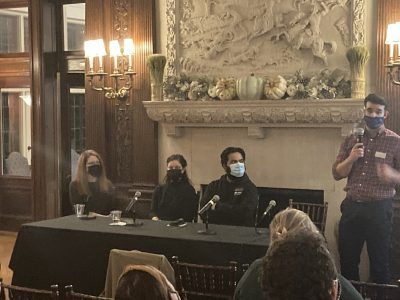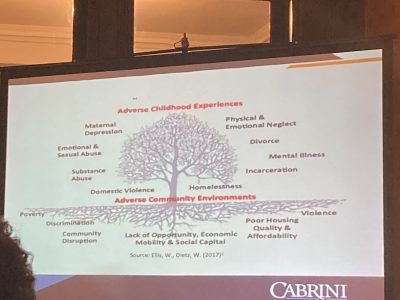Cabrini Day’s theme “Healing our World Through Prophetic Vision and Activism,” revolved around honoring the legacy of Mother Frances Xavier Cabrini, an important historical event for years.
Wrapping up Cabrini Day’s celebration, was a faculty panel presentation on healing modalities in all professions held in Cabrini’s Mansion on Nov. 16, between 6 p.m. and 7 p.m.
The presentations this year, did just that – how can we help each other grow, without tearing each other down.
“We must stay connected, share our growth and be courageous by showing our love for each other,” Dr. Crystal Anderson, PhD, department of Educational Policy and Leadership, said in her opening statement for the panel. “Love, of course, is at the center of our humanity and it will heal our lives. In this spirit we come together to reflect and engage no mater who we are, where we are from or what values or beliefs we live by.” Anderson, PHD, has been a full time member at Cabrini University for five years. She teaches at both the undergraduate and graduate level within the department of Educational Policy and Leadership.

The faculty on the panel included Professor Marion Callahan, communication department, Dr. Johanna Crocetto, DSW, LCSW, social work department, Dr. Vinayak Mathur, biology department, and Dr. Bryan Peightal from Cabrini’s counseling and psychological services.
Covering tragedy in the media
Callahan, a journalist all of her life, gave a presentation revolving around the idea of “being a human first” as a journalist and how to cover tragedies in the media.
“I was never that reporter that said ‘how do you feel?’ I would not do that,” Callahan said. “At some point we did have to reach out, we had no choice, it was a part of our job, to at least extend ourselves to the families…When I did speak to someone, I was nervous, but I was always a human first.”
She passionately spoke about her role as a journalist and how important it is to approach the victims in a different way, realizing that they have just experienced some sort of tragedy. She found most often times that the families did want to speak about their loved ones when she asked them what they wanted to share and wanted others to know. She spoke about how some journalists can put pressure on victims to speak so that they can get a story. However, that is not how she approaches victims.
She recalls a special time when a victim told her “you are the only person today who has treated me like a human being.”
“It’s important to speak from the heart as a journalist,” Callahan said. “In order to connect with these victims, it’s important to treat them as human beings.” She emphasized when interacting with victims, the importance to treat them with dignity and respect.
Trauma-informed practices
Crocetto, spoke about the idea of trauma-informed practices, and the importance of dealing with real life trauma experiences.
She presented factors that could cause trauma such as adverse childhood experiences like physical and emotional neglect, divorce, domestic violence, substance abuse, homelessness and incarceration. She also included adverse community environments such as poverty, discrimination, violence and lack of opportunity.

Crocetto described things that can be impacted by trauma and adversity, including regulating emotions, cognitive process, relationships, physical and mental health and perception and beliefs.
Part of the healing process and helping someone that is dealing with trauma, is making them feel as comfortable as possible. The whole idea is to not make the person feel ashamed about their struggle or experience, but instead try to understand them.
“Instead of asking the person, ‘what is wrong with you, ask what has happened to you and how can we best deal with these issues,” Johanna said.
Approaching someone this way is an example on how to help someone that is dealing with mental health issues and traumatic experiences instead of judging them. Often times in society, a lot of people are afraid to talk about their mental health because they’re afraid of how other people may view them. By judging and bullying a person’s struggle with trauma, it can really damage that person’s self worth and esteem. And even sometimes, depending on how terrible the verbal bullying gets, it can lead to that person taking their own life.
It’s been proven that in order to heal one another, shaming someone for their trauma isn’t the answer to solving the issue. But instead supporting each other and being there for them every step of the way is the key strategy. Becoming trauma informed will give you an understanding of the impact on the individual and avoid additional trauma.
Community healing through environmental justice
Mathur presented environmental justice work and community guidance that Cabrini is launching in the near future.
Mathur explained the work that Cabrini students have done for environmental justice. Students tested 20 samples of soil in various childcare centers in the Norristown, Pennsylvania area. They found that 18 of the 20 samples of soil had acceptable lead levels, while two out of the 20 samples had a dangerous amount of lead.
The importance of lead in soil can affect child development. The samples that had dangerous levels of lead were found in a low-income neighborhood daycare, so the students created a Go-Fund Me page raising money to have artificial turf installed so that the children would not be affected by the lead levels. This is a major success story in this area, as the students were able to help the community.
In a cohort-based scholarship program at Cabrini, students have the opportunity to engage in social justice issues through science, technology, engineering and math through projects.
In 2019, students researched best practices for campus-based community food pantries and as their community service project to build a community garden on campus. The benefits of the community garden would give the students hands-on nutrition learning, emotional connection to how food is grown and how food security leads to food sovereignty.
The pandemic didn’t allow for the garden to open, however, Cabrini plans to work with the Wolfington Center to develop community container gardens through grants that will make this sustainable.
Choosing self compassion
Peightal, a Cabrini psychologist, spoke about self compassion. He opened up his presentation with a reflection. He asked the crowd to reflect upon a time when a friend was struggling, and how you responded. As well as vise versa, how did you respond internally to yourself when you were struggling.
“I think people are amazed at how often the answer to that question is significantly harsher, significantly less understanding. It is amazing the students that I talk to are the most supportive person in the world when a friend comes up to them… now when the same situation happens to them, they [downgrade] themselves,” Peightal said.
Peightal expresses how hard an individual can be on themselves but when it comes to other people, they can be the most supportive in the world. They wouldn’t use certain harsh language towards someone else, like they do to themselves.
He describes self compassion as responding to yourself in a kind, warm, comfortable way, view our struggles not as abnormal and lean into our humanness. “The more we are to be empathetic to ourselves, it allows us to give more to the people around us,” Peightal said.
People who reflect on this presentation, Peightal hopes they understand the mantra of “treat yourself as if you are a good friend.”
Conclusion
Through their presentations, the crowd could tell how much the panelist truly cared about their professions, their eagerness to help others heal and help them grow through their emotions while speaking. The event was something that Mother Cabrini would be proud of, if she were alive today watching.


